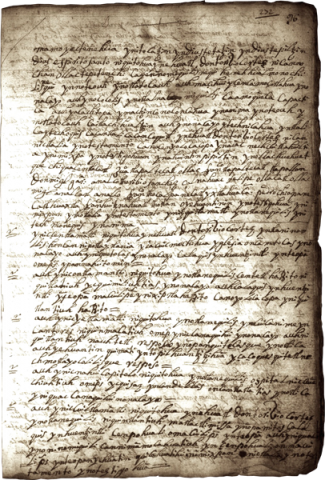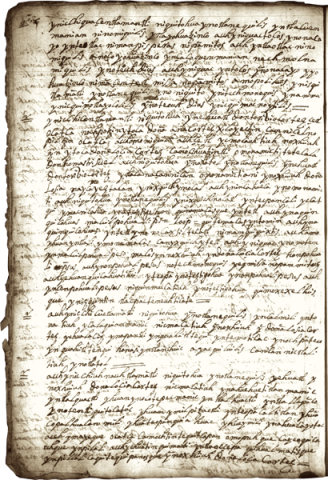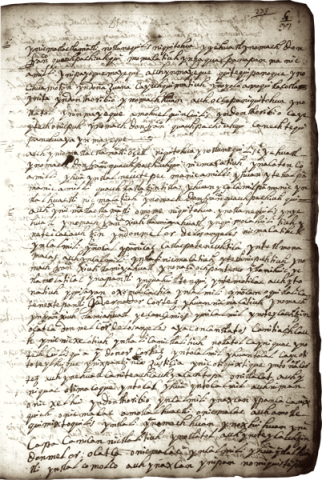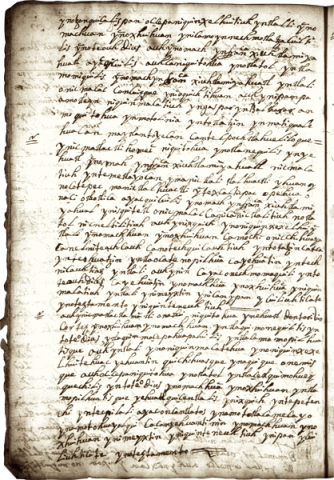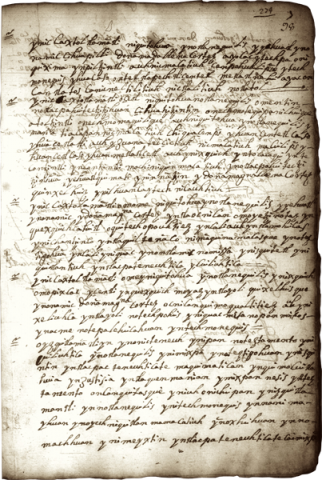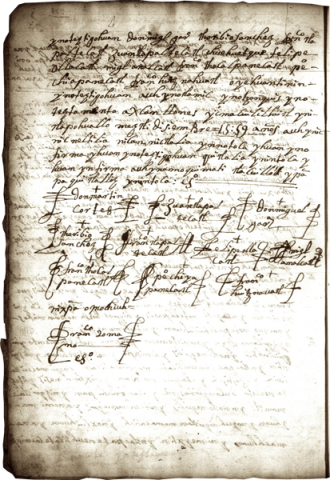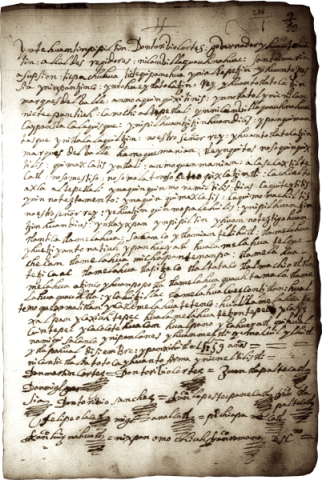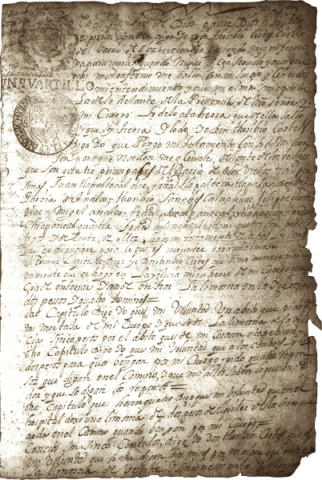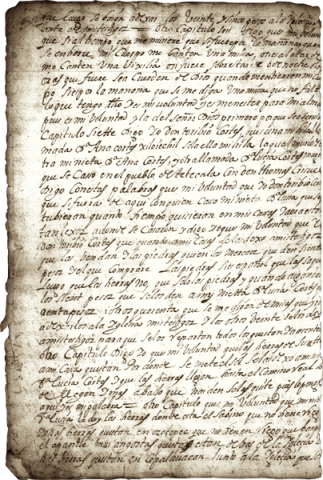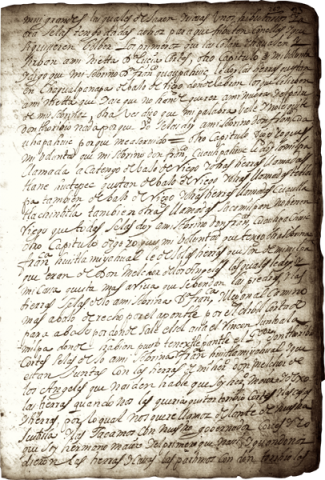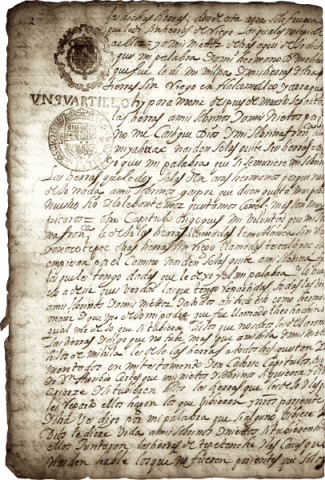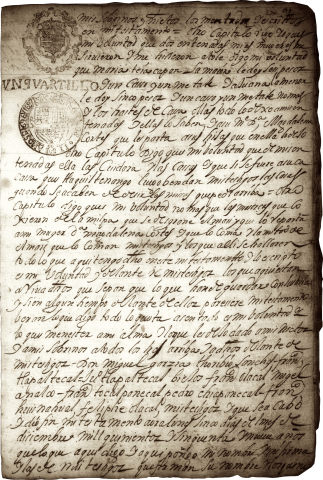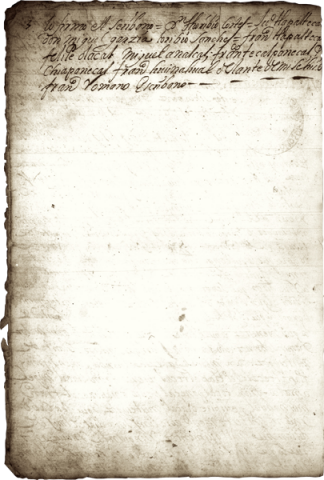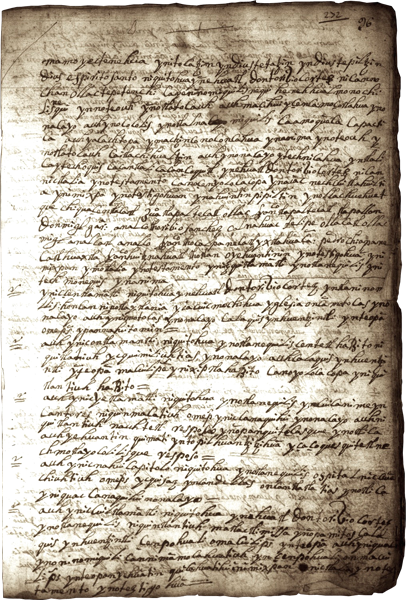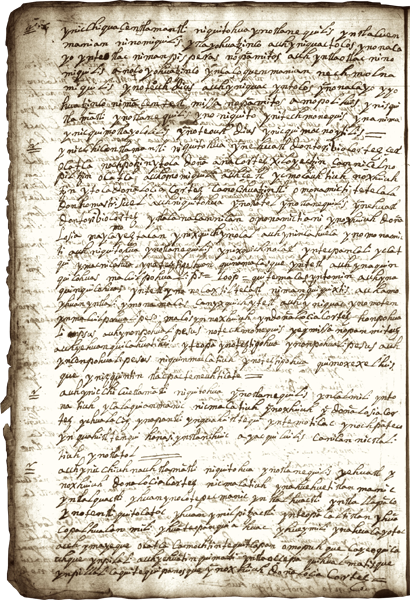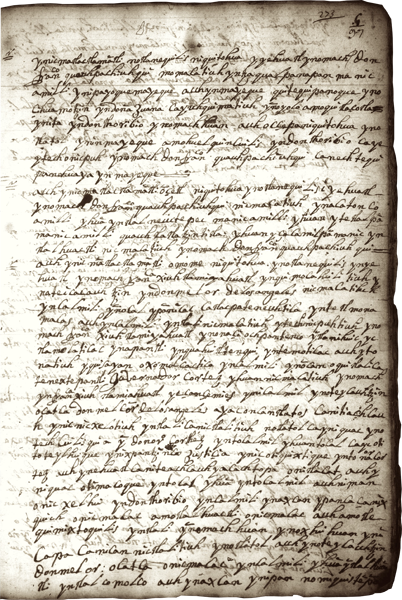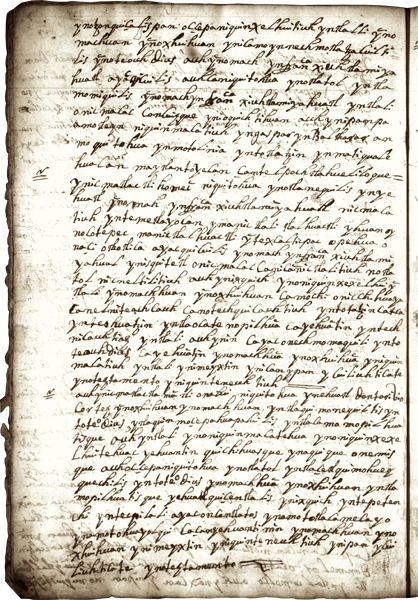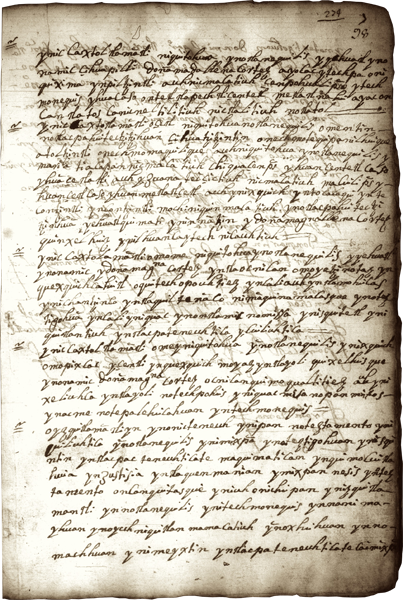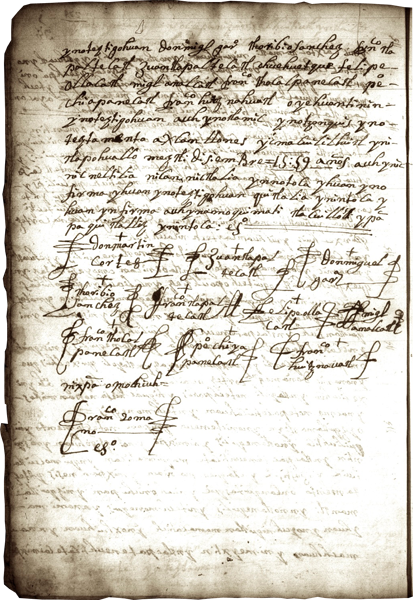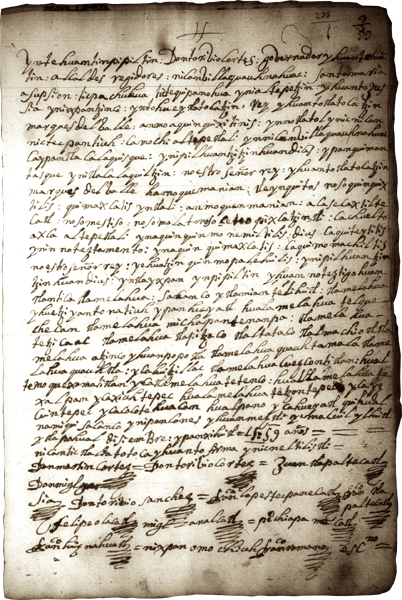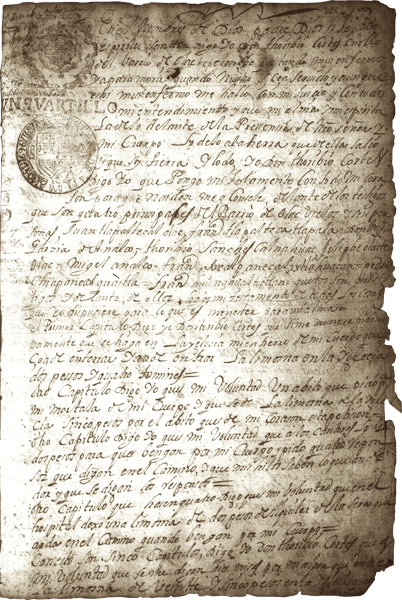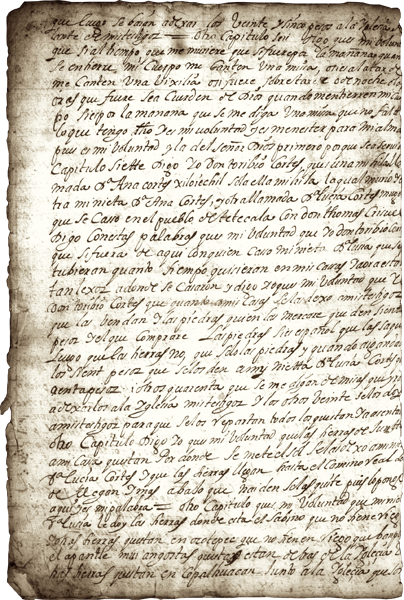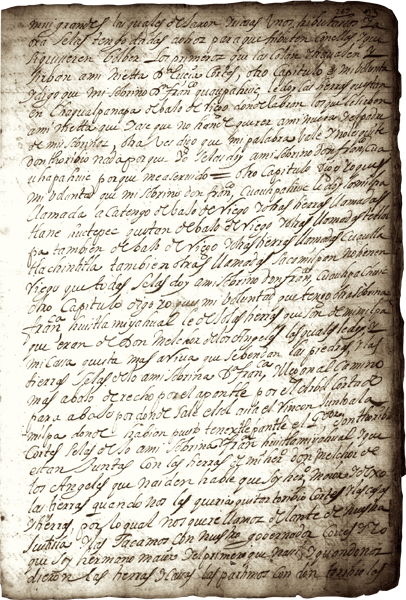The Testament of don Toribio Cortés, Cuernavaca, c. 1559.
Transcription, translation, and analysis by Robert Haskett.
The will of don Toribio Cortés comes down to us thanks to an early eighteenth-century property dispute pitting the holder of the sugar ingenio of Santa Ana Amanalco versus the indigenous town leaders of Cuernavaca. The urgency of the situation prompted Cuernavaca’s early eighteenth-century Nahua town leaders to present the Nahuatl text and a late-seventeenth-century Spanish translation of the testament to the adjudicating authorities as evidence of legitimate corporate landholding. At first glance, the format and language of this sixteenth-century testament seems standard for the era. Typically, don Toribio’s will begins with an invocation of the Trinity, and a statement that while his body is sick, suffering from “my cocoliztli,” his spirit was “happy,” or in other words healthy. Don Toribio placed his soul in God’s hands, his body in the earth from which it came. The testator invokes his witnesses, naming ten men, some identified as “noble elders.” Several of the witnesses have “surnames” that translate as “person of [a specific district of the altepetl]:” Felipe Ollacatl, Francisco Tlapaltecatl, and Miguel Analcatl.[1] Only one witness has the title “don” (don Miguel García), and he is joined by Toribio Sánchez as the only two witnesses with fully Spanish names; this kind of naming pattern is entirely consistent with usages in mid-sixteenth-century Cuernavaca.
Our testator asks to be buried in the “newly built” church, undoubtedly the Franciscan monastery church that still dominates the center of town. This would be a proper and desired burial location for a lord of don Toribio’s presumed stature, as would his burial in a “habit” (ixiptla habito) undoubtedly a Franciscan one.[2] A bit of pomp and circumstance would have been added to his funeral by the activities of singers (glossed in parallel by the Nahuatl cuicanime and its Spanish equivalent cantores) performing four responso (sic; prayers for the dead, part of the divine office for the dead) on the road as his body is brought to the church.[3] Don Toribio asks that two pesos be given to the local hospital, to be used to provide lit candles along the road where his funeral procession passes (it is not clear whether these candles were to be set along the road, or carried by those in the procession).[4] In the will’s sixth paragraph the testator asks that ten Masses be celebrated for him, ordering that a large amount of money—25 pesos—be offered to pay for them. All of this indicates that the lordly don Toribio wanted to have a send-off worthy of a wealthy, high status individual.
Don Toribio’s principal heir is his adult granddaughter, doña Luisa Cortés. Instead of leaving her his house, described as a tecpancalli (palace), he instructs his witnesses—who seem to have acted as albaceas, too--to sell off the stone but not the land, and to distribute the resulting 100 pesos from the sale as follows: forty pesos to his granddaughter, forty pesos to the church to fund three more Masses, and twenty pesos to be divided among the 10 witnesses. Doña Luisa is to get the houselot, as well; the borders of this plot are described in the testament, typically marked with features such as tree stumps and the edge of a road. Doña Luisa is also to receive two plots of pillalli (noble land) described as tlalhuactli (non-irrigated land) bordered by other fields, named places, churches or chapels (teopancalli; teopan) and natural features (for instance, “Ahuehuetitlan,” which could be a placename, or could mean “by the cypresses”). Of note in relation to these fields is the reference to the former presence of mayeque (dependent workers) who used to take care of them. They have gone away—a hint at the disruptive effects of the onset of the colonial regime, perhaps, or maybe due to epidemic disease—but would have to resume their work on the fields for the granddaughter if they should ever return, suggesting that don Toribio lived in what was undoubtedly the forlorn hope that “his” dependents still had an unaltered obligation to serve him and his family, even if these people were not technically slaves in the classic sense. Thus the family seems to have experienced at least some decline in their former power and influence, at least in comparison to what it must have been in pre-contact times. They were obviously still land rich, and if the bequests to the church are any indication, had some amount of liquid wealth.
A kind of secondary heir is a nephew named don Francisco Quauhpachiuhqui, who is to receive three irrigated fields and three non-irrigated plots. The heir don Francisco is also connected to a touchy situation connected with another irrigated field he was to inherit at, or called, Tzaqualpanapan, where he is to take over control of the mayeque who apparently still lived on and worked this land. However, at the time the testament was drawn up, these mayeque were working for a woman described as a “daughter-in-law” named doña Juana. Our testator apparently told his notary that this doña Juana’s father (yet another don Toribio) did not love his daughter and was trying to wrest control of the mayeque from her; unnamed “nephews” allegedly disliked doña Juana, too. These familial relations are not described more explicitly, and so are now somewhat confusing. If doña Juana was actually don Francisco’s wife, our testator don Toribio may be transferring the mayeque to the husband’s control to protect them from the machinations of the other don Toribio and his relatives.[5]
Another heiress is don Toribio’s niece, Francisca Xiuhtlamiyahuatl, daughter of his deceased younger brother, don Melchor de los Angeles. Our testator bequeathed her two plots of tlalhuactli (non-irrigated land) and a calmilli house lot; in the midst of boundary descriptions don Toribio recalled a successfully concluded dispute between him and the “governor Cortés.” Whether or not this is Hernando Cortés the conqueror, or an indigenous governor with the Cortés surname, is not made clear: the first post-conquest indigenous governor of Cuernavaca was a tlatoani with the baptismal name don Hernando Cortés, yet it is also known that the first Marqués del Valle engaged in a number of lawsuits with local indigenous nobles over land tenure issues, as did the second Marqués.[6] Don Toribio singles out two men or boys—Gaspar and Baltasar—barring them from inheritance and claiming that they were “dissolute youths.” The testator also makes a rather puzzling declaration that he is leaving so much property to his nieces and nephews because God did not give him any children. Of course, one of his heirs is called a granddaughter, so that he would have had children, so this statement probably has the sense of “I have no living children.” There is a strong indication that his second wife and her children were not going to receive equal treatment in comparison to his granddaughter, nieces, and nephew. For instance, don Toribio left his current wife, doña Magdalena Cortés, 20 pesos, a couple of kettles, a bed, four metates, and a portion of stored maize kernals, or in other words some domestic items that, for some reason, were his property rather than hers. While the testator also remembered his two stepdaughters, girls from doña Magdalena’s presumed first marriage, they did not get much except for a few more kitchen items. Moreover, the two girls were described almost as if they were servants. This rather shabby treatment of his second family may have been based on the existence of martial discord. Don Toribio stated that had his wife stayed in Cuernavaca, he would have provided a house for her. Instead, she seems to have gone off to her original home in neighboring Tlaquiltenango, a move that prompted him to order his witnesses to sell the Cuernavaca house (possibly a different structure from the tecpancalli that was to be dismantled); this marriage may have been a failed attempt to forge some kind of political alliance based on pre-contact models. The main body of the testatment ends with the standard disclaimers about the document being an authentic record of the testator’s wishes, as guaranteed by the presence and signatures of the witnesses; actually, none of the witnesses were able to write, so the notary provided their “signatures” himself. The codicil that follows the main body of the will concerns lands that allegedly became property of the altepetl itself.
The name of our testator, don Toribio Cortés, is the same as that of a more famous narrator-hero inscribed in Cuernavaca’s primordial titles, a legendary figure who was quite possibly himself a fusion of several ruling class men who lived in Cuernavaca during the post-conquest sixteenth century.[7] Further, the will’s codicil is very primordial title-like. It bears the same date as the main body of the will, and is signed by the same notary. But though it contains descriptions of lands that seem to have been left to the altepetl by don Toribio, upon closer inspection there is no will-like language specifically stating that the testator is bequeathing some of his properties to Cuernavaca as altepetlalli (land of the altepetl). Thus it appears that the codicil was added to a later-colonial copy of an older testament. For instance, the Spanish translation of the testament, written on paper stamped "1696/1697," does not include the text of the codicil. Moreover, while the codicil witness list is nearly the same as that found attached to the main body of the will, not only is don Toribio Cortés added as a testigo, but the Torbio Sánchez of the main body of the document becomes “don” Toribio in the codicil (look for other subtle differences, too, as you read the testament). As in Cuernavaca’s primordial titles, whoever wrote the codicil was quite concerned that non-Indians might try to appropriate the land being described in it: Spaniards, Spanish priests, mestizos, and mulattoes. This part of the manuscript enshrines the typically dualistic attitude towards Spaniards found in titles: the good king (often Carlos V) and/or conqueror Cortés, conveniently far removed in time and space, versus potentially troublesome Spaniards and other non-Nahuas living among them in their present. The codicil even includes the placename “Quauhtamala” in its boundary description, a location somewhere in the Cuernavaca area (rather than the better-known Kingdom of Guatemala) that was associated with the narrator-hero don Toribio in some of the primordial titles.[8]
Orthographically, the hand found in the text is not of sixteenth-century origin. There are far fewer abbreviations in the codicil, and no use of auh to introduce new phrases or sections; instead, ca is used for this purpose. The codicil has almost as many loanwords in its single folio as there are in the much longer “original” section. While some of these loans are shared between the two sections, the majority are only found in the codicil: officer titles and other words having to do with local and colonial government of the type that were ubiquitous in of various kinds of municipal documentation as well as in Cuernavaca’s primordial titles. In the context of the present manuscript, in other words, they are exceptional and “unwill-like.” In all sections of don Toribio’s testament, “s” is commonly used in place of “ç” and “z,” as is the frequent insertion of capital letters, often where they do not actually seem to belong. The existing manuscript is pretty clearly from Stage 3 and, given the absence of a Spanish translation of the codicil, likely from the time of the Amanalco sugar estate dispute. This expanded copy of a 1559 manuscript—the will of a lord named don Toribio Cortés, a mid-sixteenth-century noble Nahua who shared the surname with the best known primordial title founder/narrator—was finished off with a primordial title-like codicil that was added much, much later. This means that don Toribio’s testament is really a “will-title,” a conscious repurposing of a modified sixteenth-century original. The new version of the testament provides a will for the altepetl’s storied narrator hero of such important primordial titles as the Codice Municipal de Cuernavaca, and gives his blessing to corporate landholding. The juxtaposition of the codicil with the testament implies by association, rather than through explicit testamentary language, that don Toribio presided over the creation of the altepetlalli glossed in the added folio’s boundary description. The recreation of this manuscript came at a time when Cuernavaca’s indigenous leaders were trying to expand their arsenal of written evidence for their immemorial and legitimate possession of properties threatened by an expanding Spanish-owned sugar estate.
Endnotes:
1.) Ollac, Tlapallan, and Analco were three of Cuernavaca’s main wards; -catl means “person of” a specific place.
2.) It is interesting that whereas the building is referred to by the loanword “yglesia,” the offering for the burial is to be given to the teopan (“church,” “temple”). Perhaps the locative “-pan” is essential here, reinforcing the entry of the money for the burial into the “church” in the generic sense of the church as an organization, while “yglesia” is specifically about the new, obviously Spanish-style building (even if the labor was undoubtedly provided by the indigenous people of Cuernavaca). The paring of “ixipla[tl]” and “habito” here is interesting: either the Spanish is seen as the equivalent of the Nahuatl, or this is a specific kind of “habito,” not one actually worn by a friar, but a “substitute” made specifically for use in burials. This would be especially true if, as seems possible, “ixipla” is meant to be run together with “habito” to form a compound noun “ixiptlahabito.” Unfortunately, the typically spare and workmanlike colonial-era Spanish translation of the will does not clear up this issue, ignoring the ixiptla altogether and referring only to an habito (William L. Clements Library Cuernavaca Papers, fol. 92r).
3.) At least one of these may have been the ancient and traditional "Libera me, Domine, de viis inferni qui portas æreas confregisti et visitasti inferum et dedisti eis lumen . . . qui erant in poenis . . . advenisti redemptor noster" etc. This is one of the few texts in the Roman Liturgy alluding to Christ's descent into hell,”according to the Catholic Encyclopedia (New Advent, http://www.newadvent.org/cathen/11220a.htm).
4.) It is also possible, of course, that there is no connection between the offering to the hospital and the candles, which were simply two things lumped together in this section either by the whim of the notary, or because the testator mentioned them in more or less the same breath.
5.) It is just possible to interpret the Nahuatl as saying that doña Juana doesn’t love her father or the nephews, so that the testator don Toribio may be punishing her by taking the mayeque away from her.
6.) Haskett, Visions of Paradise, 205-206.
7.) The testator don Toribio is not likely to have been the famous governor of the same name, who was sill alive a couple of decades after the present will was written, though it is remotely possible that the gobernador’s testatment had been drawn up at a time when he had been ill but then survived.
8.) See Haskett, Visions of Paradise, 133.
